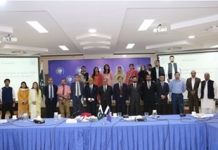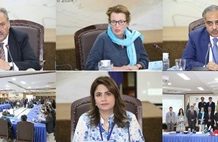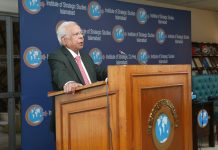FULL TEXT OF THE SPEECH BY THE BRITISH HIGH COMMISSIONER TO
PAKISTAN, PHILIP BARTON OBE CMG
SECTION 1: CASE FOR OPTIMISM
Ambassadors, Ladies and Gentlemen,
Thank you very much to the Institute of Strategic Studies here in Islamabad for hosting me today. I am very grateful to the Institute, and in particular Ambassador Masood Khan and Ambassador Khalid Mahmood, for giving me the opportunity to share my parting thoughts on the future of UK- Pakistan relations.
I leave Pakistan next week at the end of my tenure as High Commissioner. I do so after more than two years here, but also having first visited the country more than 20 years ago.
Now is a good time for me personally to take stock of the relationship between the UK and Pakistan and to look to the future.
Let me start by saying something about Pakistan itself. It is easy in this country to be a pessimist. There is a regular diet of tragedy and bad news. Few countries have suffered as much as Pakistan from terrorism. But I leave more optimistic than ever about the future of the country.
Let me tell you why. I believe the country is now on a positive trajectory in four crucial areas – democracy, security, the economy and regional relationships.
Taking each in turn:
First, democracy.
I believe that step-by-step this is becoming entrenched in the country. The 2013 elections were better than the 2008 elections with the overall outcome reflecting the will of the people. I am confident that the 2018 elections will be better still given the electoral reforms currently under consideration. No electoral system is perfect. Pakistan needs a system that is robust enough for those who lose elections to accept the outcome. That is the essence of the democratic process.
2014 was a difficult year for the country. But I believe democracy came out strengthened. Parliament stood behind the elected government. Those seeking an unconstitutional change of government did not prevail.
Since then, we have seen local elections across the country. These were the first local government elections since 2001. They represented another step forward in the country’s democratic development. But they also provided some important lessons for the conduct of future elections. There is a window now to improve transparency, women’s registration and participation and voter education in advance of the 2018 elections.
Second, security.
Out of the terrible tragedy of the barbaric attack on the Army Public School in Peshawar in 2014 came a national consensus and a determination that terrorism in all its shapes and forms should be tackled right across the country. I salute the bravery of the Pakistan military – and their civilian counterparts in the police and other law enforcement agencies – as they carry out the very difficult task of tackling terrorism across the country, in particular in the tribal areas and Karachi.
The results are striking. The Pakistan Institute for Peace Studies’ statistics show a 48% fall in terrorist related attacks in 2015 compared to the year before and a 38% fall in the number of deaths.
The argument is no longer over whether to take on all groups, but how best to go about it. That is a significant positive development.
Third, the economy.
The last two years have seen a significant turnaround in Pakistan’s economic prospects. Following the 2013 elections, the government took steps that prevented a balance of payments crisis and began tackling the deficit. The economy stabilised and growth has begun to pick up – although higher growth is required if poverty is to be reduced. There is a real prospect that Pakistan will complete its IMF programme for only the second time out of 16 starts.
And fourth, Pakistan’s relationships with her neighbours.
Pakistan was born in a challenging neighbourhood. The country has had difficult relationships with most of its neighbours. But I believe this is changing.
Iran’s emergence from international sanctions and its drive to improve its economy is good news for Pakistan. There is now an opportunity to normalise the commercial and economic relationship between the two countries to the benefit of both.
At the same time, the relationship between Afghanistan and Pakistan is moving back onto a positive trajectory. Just two months ago, we were not sure that President Ghani would attend the Heart of Asia Meeting here in Islamabad. We certainly did not know that a new quadrilateral process involving Pakistan and Afghanistan would have met twice by now to chart a path to peace.
So while the relationship has been under some stress over the last six months, there is now the prospect of starting the new chapter President Ghani and Prime Minister Nawaz Sharif talked about when President Ghani took office in late 2014.
Looking to the East, it is for India and Pakistan to decide on the kind of relationship they want. Nevertheless, I welcome the mature way in which both countries dealt with the aftermath of the terrorist attack on the Indian Air Force base at Pathankot.
I can say in all honesty that I did not expect that during my tenure an Indian Prime Minister would join the Prime Minister of Pakistan at a family wedding in Lahore. I know that British High Commissioners are supposed to be all “knowing” and all “seeing”. But this is not something that I saw coming.
Pakistan’s final neighbour is, of course, China. Much has been said about the China-Pakistan Economic Corridor. From a UK perspective, Chinese investment in the development of Pakistan’s infrastructure is very welcome, just as it is welcome in the UK. The scale of the investments envisaged could have a very significant positive impact on the economic development of the country. The UK and British businesses are ready to help to maximise the benefits for the people of Pakistan.
So my optimism is not the naïve view of a departing diplomat trying to present the best possible case.
Pakistan offers its people democracy, which is more than can be said for 40% of the world’s population.
The security situation is improving.
The economy is growing – and poised to accelerate, if further structural reforms can be made.
And there is the potential now for Pakistan to be part of a more peaceful, prosperous and stable region.
SECTION 2: THE UK ROLE
As British High Commissioner, I am particularly proud of the breadth and depth of the United Kingdom’s relationship with Pakistan.
People-to-people links are at the heart of this relationship. People of Pakistani origin are a major part of public life in the UK: from politics, to government, to the arts, to business, to sport; people with family ties to Pakistan are making a real difference to my country.
These links help to deepen our economic ties. They also mean that the challenges we both face are shared challenges, whether that is from drug trafficking, terrorism, organised crime, or illegal migration.
I am proud to have led the work of the British missions in Pakistan. I believe that we are making a real difference.
Through UK Aid and the work of the Department for International Development, there are 1.3 million Pakistanis who have had microfinance loans thanks to the UK.
We have helped 270,000 women gets CNIC cards supporting their citizenship rights.
5.2 million of the poorest families in Pakistan are being supported by the Benazir Income Support Programme, part-funded by the UK. This programme is also providing incentives to over 1 million children to attend and stay in school, through its conditional education transfers.
Nearly 1 million births have been attended by professionals supported by the UK.
On education, 6.3 million Pakistani primary school children have benefited from direct UK support.
The British Council will train 1 million teachers of English by 2018, to help improve the way English is taught in schools.
Every year, the British Council enables 220,000 people to take nearly half a million UK exams here in Pakistan.
We have helped 118 Pakistani Universities to develop partnerships with over 90 universities in the UK.
We have quadrupled our Chevening scholarship programme for people to study fully-funded Masters degrees at the UK’s top universities. There are now some 1300 Pakistani Chevening Alumni.
Thanks to the UK-backed CAPRI programme conviction rates in terrorism cases have increased from 5% to over 50% in Punjab and from 3% to over 30% in KPK.
91 public prosecutors representing every province of Pakistan have either completed or are undergoing intensive, bespoke 12-week counter terrorism training. 5000 military and law enforcement personnel have been trained in countering IEDs
I have made improving the commercial relationship between the UK and Pakistan a personal priority. I am delighted that trade grew by 12% in 2014. I am confident that the figures for 2015 – when they come – will show a further increase.
As Pakistan continues to grow, the business side of our relationship will become increasingly important.
There are already over 100 British companies in Pakistan. And, whether building shopping malls in Lahore, offering access to global banking, or providing professional services for Pakistan’s biggest companies, British businesses and business people are integrated into Pakistan’s economy.
Looking ahead, what does the future hold in store? I am very confident about the future relationship between the UK and Pakistan. We are of course linked by history. One of the highlights of my time in Pakistan was to visit the Regimental Museum of the Punjab Regiment – my grandfather’s regiment – in Mardan and to be shown three documents (from among the 400,000 the museum holds) that he had signed in the 1920s.
But it is the people to people links that represent the present and the future. They are why the partnership between the UK and Pakistan is enduring.
SECTION 3: PAKISTAN’S CHALLENGES
I also sense that now is the first time for many years that people in Pakistan have had the space to think about the country’s long term challenges and opportunities and what to do about them. They are no longer having to worry about a crisis next week, next month, or even next year.
I see three big, interlinked challenges for the country – demographics, climate and economic development.
Pakistan has a very young population. A third of its population is aged under 14 and 60% are under 25. This can be a strength – if these young people are properly educated and given the chance of a job. Good policies, based on rights and sensitive to gender, can address and harness population dynamics and turn this into a demographic dividend.
The Population Summit held in Islamabad last November showed the commitment of political and religious leaders in Pakistan to addressing population issues, reaching a consensus endorsing the use of family planning.
We will help Pakistan tackle these challenges and make the most of the opportunities.
Linked to demographics is the issue of climate change and access to water. Pakistan is the 8th most impacted country by climate change in the world. With nearly 500 people dying from extreme weather, Pakistan was 5th on the list of nations most affected by the direct consequences of extreme weather in 2014.
The world is responding. The COP 21 meeting in Paris last December agreed to keep global warming below 2 degrees as the global objective – and aims to limit it to 1.5 degrees. It mandates stock-takes of progress and sets a collective long term goal for net zero emissions in the second half of the century.
For countries like Pakistan – at the front line of climate change – it establishes a new long term goal to strengthen adaptation and resilience and reduce vulnerability to climate change. Significant funds – at least $100 billion from 2020 – will be available to help developing countries to take actions to mitigate and adapt to climate change. Lack of resources will no longer be an excuse for inaction.
Finally, economic development. The UK has strongly supported the Government’s macro-economic programme and, in particular, Pakistan’s programme with the IMF.
This has stabilised the economy and brought about rising growth.
But it has not yet led to the level and pattern of growth required to create job opportunities on a scale that a growing and increasingly youthful population needs. To achieve the necessary growth rates of 7 to 8% per year, Pakistan’s economy needs to become more productive and competitive. This will require deeper structural reforms in three areas – the energy sector; pressing ahead with privatisation and increasing the collection of tax.
I recognise that none of this is easy. Much of it is highly politicised and no-one likes paying more tax. Pakistanis are generous people, but fewer than 1 million people file income tax returns and about half those numbers actually pay taxes. Pakistan collects about 11% of GDP in tax – one of the lowest tax to GDP ratios in the world. This is not nearly enough to finance critical basic services, such as education and healthcare.
The UK is helping. We are developing an important partnership between the UK tax authority HMRC and the Federal Board of Revenue. And DFID is providing technical assistance in partnership with the World Bank to federal and provincial revenue authorities in tax policy, tax administration, and automation.
But, in the end, this comes down to individuals and the implicit contract between the state and the citizen in a modern democracy and society. That individuals and businesses pay taxes in return for the provision of basic services.
SECTION 4: CONCLUSION
I visited Pakistan often before coming here as High Commissioner. But it is only when you live in a country that you start to get to know it. I have tried my best over the last couple of years to get beyond the Islamabad diplomatic bubble and the straight-jacket of security.
I have not visited nearly as much of the country as I would have liked.
But what I have seen has led me to conclude that this country’s great strength is its people – their ingenuity, hospitality and energy.
I believe that I have the best job in the British Diplomatic Service.
My successor, Tom Drew will arrive later this month. He is a very lucky man.
Let me end by saying thank you:
- to the Institute of Strategic Studies, and Ambassador Masood Khan for hosting me this afternoon;
- to all of you for coming along to listen; and
- to people all over Pakistan who have made me so welcome throughout my time here.
Wherever I am in future, I will be a friend and supporter of Pakistan.













